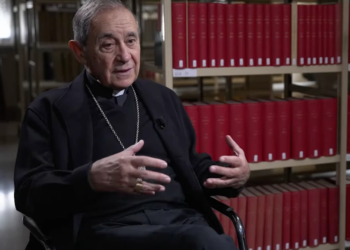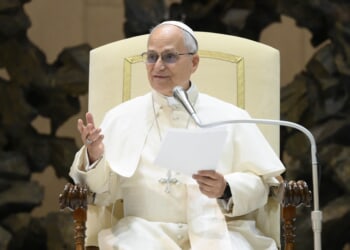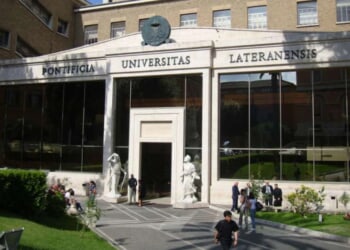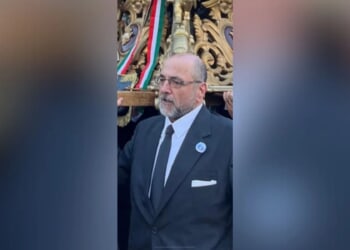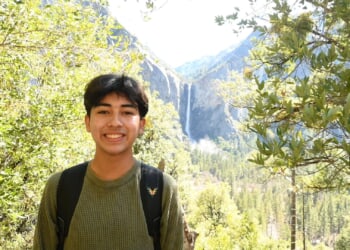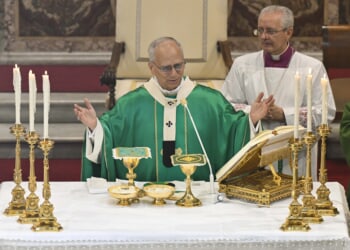Recently, the National Assessment for Educational Progress (NAEP) released its 2025 report, assessing that there was no educational progress. Called the Nation’s Report Card, NAEP measures math, reading, and science performance in fourth, eighth, and 12th grades. Scores on all three tests administered in 2024 were down from 2019 results.
“Students from the class of 2024 had historically low scores on a major national test administered just months before they graduated,” as one media report described the results. Education Secretary Linda McMahon lamented that the “NAEP results confirm a devastating trend: American students are testing at historic lows across all of K-12.” (RELATED: Linda McMahon Body-Slams Woke Classrooms)
We send our kids to schools for six-plus hours a day. They’re being taught something. If it’s not reading, writing, math, and science, then what is it?
The hundreds of billions of dollars showered on schools (and teachers’ unions) have been unable to reverse the losses from COVID closures.
We send our kids to schools for six-plus hours a day. They’re being taught something. If it’s not reading, writing, math, and science, then what is it?
The day after receiving NAEP’s bad news, we found out what at least some of them are learning.
In the wake of the Charlie Kirk assassination, the nation discovered that his killer is exactly the type of person many of those in charge of educating our kids are trying to create.
A significant portion of those exposed for celebrating Mr. Kirk’s cold-blooded murder are teachers, professors, school officials, and school board members. This phenomenon even captured the attention of the legacy media, though they predictably portrayed the offenders as most sympathetically. (RELATED: Charlie Kirk and the Shame of the ‘However’ Progressives)
To anyone paying attention, this is no surprise. Social media accounts have garnered massive followings mainly by highlighting outlandish pronouncements by teachers and other school officials publicly posted on the internet.
This is a time for those working in and around education to commit to some self-reflection.
Education or Indoctrination?
Parents who would have a say in their children’s education are sometimes told that teachers don’t work for parents; they work for society. Society would like a refund.
The truth is, they are often working for the teachers’ unions. Teachers’ unions exert outsized influence on what happens in schools and in politics. In many school districts, a teachers’ union endorsement is virtually a guarantee of victory. This allowed unions to throw their weight around during COVID, hobbling districts’, states’, and the federal government’s efforts to open schools. (RELATED: Wisconsin Places Limits on School Choice)
The unions are also among the most radical groups in America. A delegate at the National Education Association’s annual gathering who attempted to discuss with other union members “the best ways to teach reading and writing,” was told, “We don’t have time for that. We’ve got to fight Trump.” This attitude was born out in the business items the union adopted at the event: heavy on politics, light on teaching kids.
In our schools, civics has largely been replaced by activism. Students have no idea about the three branches of government, yet are nevertheless well-versed in how to engage in protest and “direct action.” Civics is the study of how issues are deliberated and debated and, often, compromises reached. Activism rarely admits compromise. Catchy chants don’t allow for informed give and take.
Children are relentlessly bombarded with activist messages frequently in school. They’re being taught that unless society “does something” about climate change, the planet will be kaput in some panic-inducingly short time period. Without knowledge of civics or economics to temper the activists’ doom rhetoric, it’s no wonder kids are exhibiting “eco-anxiety.” (RELATED: Scientists Claim Climate Change Is Causing People to Commit Suicide)
The rot extends beyond K12.
The campus protests of the last two years, infected by antisemitism and support for Hamas terrorists, are often led by or featuring faculty. With few exceptions, higher education institutions hardly covered themselves in glory while dealing with these “protests.” The more elite the schools, the worse they handled them. Even in cases where behavior clearly crossed the line of protected speech, institutions were often not merely reluctant but defiant in refusing to subject offenders to any meaningful discipline. Some of the most ardent voices endorsing or excusing riots in 2020 came from the education sphere. I personally witnessed this from career staff at the U.S. Department of Education.
Meanwhile, these schools have a recent history of shutting down free speech and debate. That’s why Charlie Kirk was a lightning rod. His campus events were the closest many students ever wandered to anything like the Socratic method. He provided a lonely rebuttal to the indoctrination to which students are subjected daily from their professors – 97 percent of whom are liberal. Unlike their classes, no student had to attend an event with Charlie Kirk, yet they came by the thousands to listen, or to “prove him wrong.” And too many of those who challenged him, presumably the best and brightest these institutions had to offer, were ill-informed, ill-prepared, ill-mannered, and frequently militantly ignorant (“Nazi” and “fascist” are not arguments). (RELATED: Charlie Kirk: The Last Debater)
Every day, parents send their most precious creations to schools, colleges, and universities, trusting they will gain the skills and knowledge to contribute to society and help create a better world. There are millions of education professionals who diligently honor their commitments to students, parents, and society. But the existence of a not insignificant minority who celebrated or justified Charlie Kirk’s assassination means now is the time for the good men and women in education to stand up and clean up their profession.
READ MORE from Michael Chamberlain:
Free Speech Is Suddenly Important to the New York Times
Michael Chamberlain is the director of Protect the Public’s Trust. He served at the U.S. Department of Education from 2017-2021.

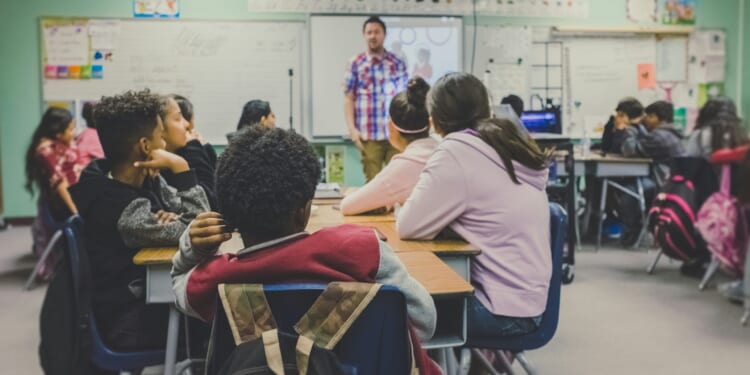
![Scott Bessent Explains The Big Picture Everyone is Missing During the Shutdown [WATCH]](https://www.right2024.com/wp-content/uploads/2025/11/Scott-Bessent-Explains-The-Big-Picture-Everyone-is-Missing-During-350x250.jpg)


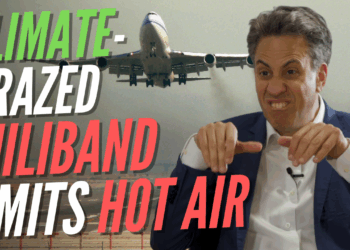
![Florida Files Supreme Court Case After Illegal Immigrant Truck Driver Kills Three [WATCH]](https://www.right2024.com/wp-content/uploads/2025/10/Florida-Files-Supreme-Court-Case-After-Illegal-Immigrant-Truck-Driver-350x250.jpg)




